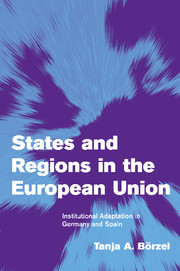Book contents
- Frontmatter
- Contents
- List of figures
- List of tables
- Acknowledgements
- List of abbreviations
- Introduction
- Part I Europeanization and domestic institutional change: A historical institutionalist approach
- Part II Reinforcing cooperative federalism: Institutional adaptation to Europeanization in Germany
- Part III Transforming competitive regionalism: Institutional adaptation to Europeanization in Spain
- Part IV Sharing versus shifting the costs of adaptation: The Europeanization of environmental policy-making in Germany and Spain
- Conclusions: Toward convergence in Europe?
- Appendix: The major EU environmental policies of the policy study
- List of references
- Index
Introduction
Published online by Cambridge University Press: 22 September 2009
- Frontmatter
- Contents
- List of figures
- List of tables
- Acknowledgements
- List of abbreviations
- Introduction
- Part I Europeanization and domestic institutional change: A historical institutionalist approach
- Part II Reinforcing cooperative federalism: Institutional adaptation to Europeanization in Germany
- Part III Transforming competitive regionalism: Institutional adaptation to Europeanization in Spain
- Part IV Sharing versus shifting the costs of adaptation: The Europeanization of environmental policy-making in Germany and Spain
- Conclusions: Toward convergence in Europe?
- Appendix: The major EU environmental policies of the policy study
- List of references
- Index
Summary
In 1992 a change in the German Constitution provided the German regions (Länder) with comprehensive co-decision rights in European policy-making. That change made it possible for the Länder not only to determine the German bargaining position if their legislative or administrative competencies were affected, but the Länder were also permitted to sit at the negotiation table in the Council of Ministers for the very first time. If a European issue falls within the area of their exclusive competencies, it is a Länder Minister, and not a member of the German government, who represents the Federal Republic of Germany in the European decision-making process.
Two years later, in 1994, the Spanish government and the 17 Spanish regions (Comunidades Autónomas) agreed on a formal procedure through which the Comunidades Autónomas were to participate in the decision-making and implementation of European policies. The procedure was further developed and became law in 1997. Unlike the German Länder, the Comunidades Autónomas do not have access to the Council of Ministers. But they can determine the Spanish bargaining position if their exclusive competencies are affected. For the very first time the Comunidades Autónomas have the right to participate directly in central-state decision-making.
The participation of the German and Spanish regions in European policy-making is a clear example of how Europeanization may affect the institutions of the member states. In both cases, we observe a formal institutional change, which aims to counterbalance the progressive transfer of regional competencies to the European level.
- Type
- Chapter
- Information
- States and Regions in the European UnionInstitutional Adaptation in Germany and Spain, pp. 1 - 12Publisher: Cambridge University PressPrint publication year: 2001

